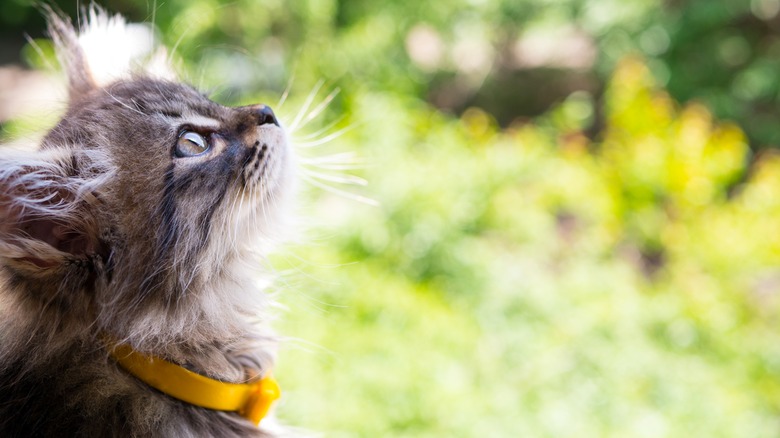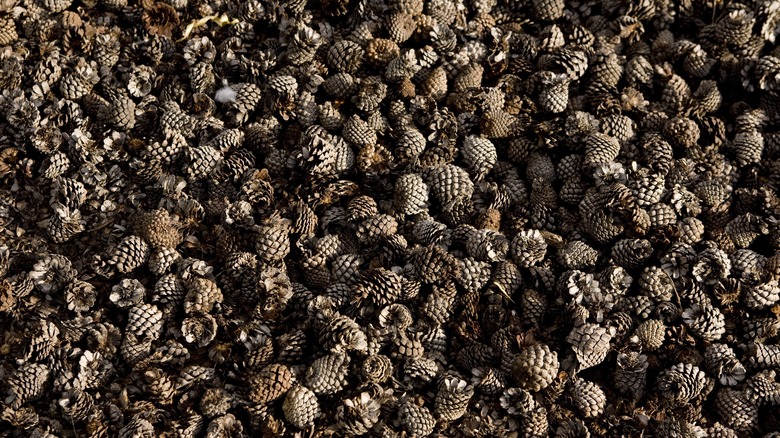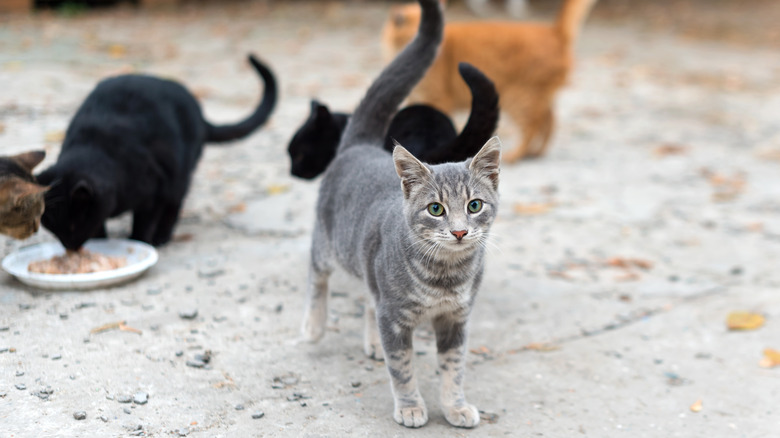5 Safe Ways To Keep Outdoor Cats Out Of Your Garden Beds
We may receive a commission on purchases made from links.
Feral felines offer some benefits to the neighborhood in which they live. K&H Pet Products explains that outdoor cats help control the number of rodents in the area, and an established and maintained community can actually reduce the total number of feral cats in an area. While a few outdoor cats may be handy to have around, they can also be a nuisance in vegetable and flower gardens. Unvaccinated felines can spread disease, while those that are not regularly de-wormed can bring parasites like roundworm and hookworm into the garden via feces. Another serious concern about cats using your garden as a litter box is the spread of bacteria, including E. coli and salmonella, according to the University of California Agriculture and Natural Resources.
There are laws against taking lethal measures against cats in all 50 states, says Alley Cat Allies, and the simple act of being in the wrong place certainly does not warrant the death penalty. While having cats in your garden can be frustrating and concerning, there are ways to safely keep your garden free of them.
Remove easy access to food sources
Even if you're not feeding cats on your property, there may be sources of food of which you are unaware. Lawn Love notes that opportunistic cats will look for food in the trash, so it's important to make sure all outdoor garbage cans are securely closed. Unfortunately, bird feeders can also be a source of easy hunting for a feral cat. Keep feeders away from garden areas and if your cat problem is extreme, consider removing the feeders altogether until the population is under control.
If you have indoor/outdoor pets, never leave their food outside. This will certainly attract neighborhood roamers looking for an easy food source. You may also need to talk to your neighbors about leaving food outside. If your neighbor's pet cat is the one making a mess in your garden, it's time to have an open and honest conversation about the problems being caused by the cat and how best to resolve them.
Use repelling scents
Although they need to be reapplied about once a week or any time it rains, naturally-derived spray-on scents repel cats yet are safe for the whole family, according to the City of Sacramento. Unlike with toxic sprays, your family can work in the garden and even consume produce immediately after applying a natural option. You might even enjoy the smell! For example, cats don't like the strong odor of citrus, so lemon or orange peels scattered in your garden act as an effective repellent that smells good too.
You can also use diluted essential oils, however, while it's unlikely a cat would ingest them because they're so unappealing to them, Osceola County Pets suggests avoiding lavender and peppermint essential oils. These can be harmful if consumed by a feline. You can dilute citrus oils by combining three parts water to one part essential oil in a spray bottle, then easily reapply it as needed. There are also commercial repellents available. Just read the instructions carefully to make sure the one you choose is safe for your family.
For those who enjoy discovering new plants, consider adding the herb rue to your beds. Rue is an easy-to-grow attractive flowering plant, and it's effective at repelling cats as well as keeping other pests off your property like squirrels. Rue can even keep deer away, states Urban Farmer.
Make the ground unappealing
Kitties like soft soil to use as their outdoor litter box, so making the ground uncomfortable to dig into can keep cats from defecating in your garden. If your neighborhood cats like to use planters to do their business, consider sticking plastic forks, tines side up, in the pot to keep cats away, suggests Cuteness. You can also use natural items like bulky wood mulch, the spikey balls from a sweet gum tree, and pinecones as a mulch to deter cats from digging in your garden beds.
Scat mats are available in many sizes and shapes; look for a brand like Homarden available on Amazon. Place these pokey panels anywhere you have a problem with cats or other pests digging. The plastic spikes are firm enough to train cats to stay away without causing any harm to the animal. Depending on how many cats you have, you may be able to surround your garden with scat mats to deter them. However, if you have particularly committed offenders, you'll probably need to use the mats throughout your beds. Choose an option that has spikes close enough together that clever cats can't step between them.
Install an ultrasonic animal repellent
Ultrasonic pest repellents use a high-pitched noise that humans cannot hear, but is rather unpleasant to cats. The Scaredy Cat mentions that you can find battery or solar powered ultrasonic animal repellents, which are motion activated. That means they won't be constantly sending out sound waves. Solar options are ideal because you never have to worry about replacing batteries or remembering to check them. However, solar ultrasonic animal repellents require direct sun exposure to operate, so install yours in the sunniest spot in the garden.
If your garden is fairly big, multiple units will be necessary since the radius of the sound waves is only about 3 to 6 feet, depending on the product specifications. Although you might have to buy a few of these items, you won't have to worry about reapplying scents frequently or worrying about using anything toxic. All you have to do is install them, and let the sound they make do all the work.
Help manage your community cat population
When the population of feral cats increases, it can cause many problems for humans and felines too. The more cats there are, the more they reproduce, and the cycle continues. Furthermore, there will be more diseases, parasites, and bacteria wherever there's an excessive number of cats, according to VCA Animal Hospitals. By helping to reduce the cat population humanely, you can keep felines out of your garden and help keep everyone safe.
Even if you're not a cat person, consider volunteering with a local trap, neuter, and release program (TNR) in your area to work toward managing the population. These organizations work with local veterinarians to humanely contain feral cats, neuter them, and return them back into their community, where they can still be beneficial without all of the reproducing. If you don't have the proper equipment or experience to trap cats safely, it's best to learn that process from the professionals. To find a group near you, contact your local Humane Society.





